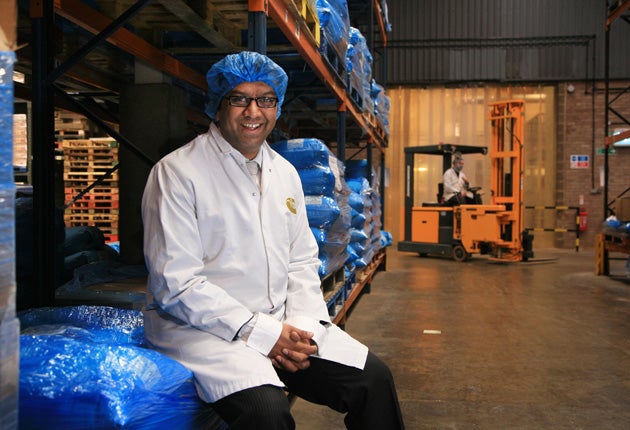'Cut the red tape and focus on the big picture'

Prospective parliamentary candidates beware, economic tinkering and business red tape are not welcomed in the Northamptonshire constituency of Wellingborough, where Conservative Peter Bone, a Sven-Goran Eriksson doppelganger, holds a wafer-thin majority of just 687.
Small business support has become a key election battleground, with each of the main parties claiming to be the champion of the disparate sector that is collectively the UK's biggest employer, biggest tax contributor and biggest engine for growth and development. But despite claims of expertise from Labour, the Tories and the Liberal Democrats, according to one small business leader in the area, none of the main parties fully understands the needs of small and medium-sized enterprises (SMEs).
Milan Shah has been running Varani Food Products, a spice company that supplies ingredients for Tesco and Marks & Spencer ready meals, for 17 years. He employs 37 people at a factory on an industrial estate and argues that politicians should stop tinkering with legislation and concentrate on improving the state of the economy. "There is no one policy we need," he says. "Small cuts in the corporation tax rate, or in the national insurance rate are great, but that's the small picture. The big picture is: what are the main parties going to do to enable the economic recovery? Whichever party wins the election, it is critical that the economy gets sorted out."
Of course, the parties all say they will do this best, but the bluster of an election has made them reluctant to spell out exactly where taxes will rise and spending will fall. Mr Bone, echoing his leadership's rallying cry, says Labour's proposed increase in national insurance contributions (Nics) is a tax on jobs, while the banks are still not lending enough. "The key is to stop putting rules and regulations in the way of small business," he says. "It is also crucial to get the banks lending again. Without that, small companies will not grow."
Mr Shah agrees with the Tory line that the Nics increase is a tax on jobs, but he also says that it is not that important. "Of course, the Tories are right, Nics increases are a tax on jobs, but it is not the biggest issue," he says. "The money will be brought back in other ways anyway, whichever party wins. Is an increase in Nics going to prevent me from hiring someone? No. That's a business decision."
But he is also stinging in his criticism of the Tory economic approach. The shadow Chancellor George Osborne has promised a new Budget within 50 days of coming to power, which is necessary to unpick the economic mess, says Mr Bone. But not according to Mr Shah: "Ever since Mr Osborne made his speech about austerity, which seemed to prove unpopular, the Tories appear to have stepped back using the economy as a key issue, which is a mistake. If Labour had pushed through a disastrous Budget, then it would be a good idea, but the Budget was benign. A new Budget would just be more tinkering."
With about 20 per cent of Wellingborough's population working in the local manufacturing industry, the constituency is a key test bed for the parties' SME policies. The seat is number 10 on Labour's target list, and the charge of meddling is levelled at the Government in equal measure. "Since 1997, micro-economic tinkering has been an abiding memory," says Mr Shah. "When we were smaller and I used to do the company payrolls there was a huge number of changes with tax credits being introduced and withdrawn. Small businesses were almost being used as a tax collector. But it was tolerated because the same guy that was giving you all these headaches, Gordon Brown, was also giving us macro-economic stability. Now we've got the worst of both worlds."
Jayne Buckland, the Labour candidate in Wellingborough, turned down a request for an interview.
Even though Varani has faced few problems from its banks, Mr Shah agrees that greater lending has been top of most small businesses' wishlists for some time, and especially from the state-backed banks RBS and Lloyds Banking Group. As part of last month's Budget, Alistair Darling said the banks would be forced to lend £94bn over the next 12 months, with at least £50bn going to SMEs.
The Liberal Democrat candidate, Kevin Barron, agrees with his Tory rival that extra lending is necessary to get small businesses growing again. "Someone I know relied on bridging loans to grow his business," says Mr Barron. "All of sudden, a little while ago, the banks pulled the rug away. Now that same company is being forced to squeeze £700,000 out of their running costs, to deliver on a successful contract. That is no way to have to run a business. "
Mr Shah warns that the candidates hoping for votes in Wellingborough on 6 May will ignore small businesses at their peril. "There are people on my shopfloor, saying, yes the economy is important – it affects my ability to get a pay rise or stay in a job," he says. "That is where the recession has thrown us into pretty sharp focus."
Subscribe to Independent Premium to bookmark this article
Want to bookmark your favourite articles and stories to read or reference later? Start your Independent Premium subscription today.

Join our commenting forum
Join thought-provoking conversations, follow other Independent readers and see their replies